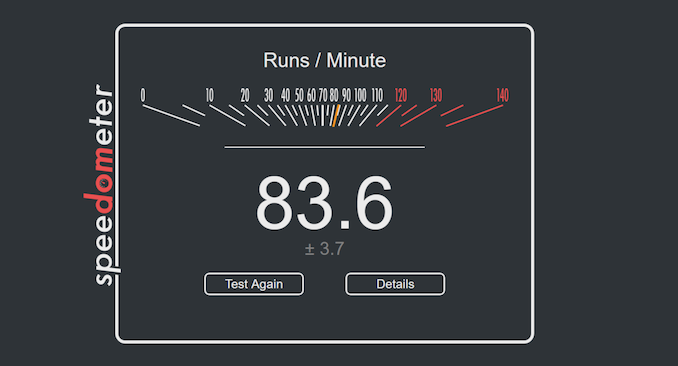AMD Threadripper Pro Review: An Upgrade Over Regular Threadripper?
by Dr. Ian Cutress on July 14, 2021 9:00 AM EST- Posted in
- CPUs
- AMD
- ThreadRipper
- Threadripper Pro
- 3995WX
CPU Tests: Legacy and Web
In order to gather data to compare with older benchmarks, we are still keeping a number of tests under our ‘legacy’ section. This includes all the former major versions of CineBench (R15, R11.5, R10) as well as x264 HD 3.0 and the first very naïve version of 3DPM v2.1. We won’t be transferring the data over from the old testing into Bench, otherwise it would be populated with 200 CPUs with only one data point, so it will fill up as we test more CPUs like the others.
The other section here is our web tests.
Web Tests: Kraken, Octane, and Speedometer
Benchmarking using web tools is always a bit difficult. Browsers change almost daily, and the way the web is used changes even quicker. While there is some scope for advanced computational based benchmarks, most users care about responsiveness, which requires a strong back-end to work quickly to provide on the front-end. The benchmarks we chose for our web tests are essentially industry standards – at least once upon a time.
It should be noted that for each test, the browser is closed and re-opened a new with a fresh cache. We use a fixed Chromium version for our tests with the update capabilities removed to ensure consistency.
Mozilla Kraken 1.1
Kraken is a 2010 benchmark from Mozilla and does a series of JavaScript tests. These tests are a little more involved than previous tests, looking at artificial intelligence, audio manipulation, image manipulation, json parsing, and cryptographic functions. The benchmark starts with an initial download of data for the audio and imaging, and then runs through 10 times giving a timed result.
We loop through the 10-run test four times (so that’s a total of 40 runs), and average the four end-results. The result is given as time to complete the test, and we’re reaching a slow asymptotic limit with regards the highest IPC processors.

Google Octane 2.0
Our second test is also JavaScript based, but uses a lot more variation of newer JS techniques, such as object-oriented programming, kernel simulation, object creation/destruction, garbage collection, array manipulations, compiler latency and code execution.
Octane was developed after the discontinuation of other tests, with the goal of being more web-like than previous tests. It has been a popular benchmark, making it an obvious target for optimizations in the JavaScript engines. Ultimately it was retired in early 2017 due to this, although it is still widely used as a tool to determine general CPU performance in a number of web tasks.

Speedometer 2: JavaScript Frameworks
Our newest web test is Speedometer 2, which is a test over a series of JavaScript frameworks to do three simple things: built a list, enable each item in the list, and remove the list. All the frameworks implement the same visual cues, but obviously apply them from different coding angles.
Our test goes through the list of frameworks, and produces a final score indicative of ‘rpm’, one of the benchmarks internal metrics.
We repeat over the benchmark for a dozen loops, taking the average of the last five.

Legacy Tests



















98 Comments
View All Comments
Mikewind Dale - Thursday, July 15, 2021 - link
Error reporting is not the same thing as error correction.Error correction without error reporting is still better than most mainstream platforms, which don't even support error correction, let alone reporting.
Mikewind Dale - Thursday, July 15, 2021 - link
I just tested ECC error reporting. It worked. Using my motherboard's EZ Overclock utility, I overclocked my DDR4-2666 to 3600. Then, I ran Memtest86 Pro.Within the first 27 seconds, Memtest86 Pro reported 17 "ECC Correctable Errors."
My motherboard is a Gigabyte X470 Aorus Gaming 7 Wifi.
My CPU is a Ryzen 7 2700X, non-Pro.
Evidently, ECC reporting *is* working on an ordinary AM4 chipset with a non-Pro processor.
mode_13h - Friday, July 16, 2021 - link
> ECC reporting *is* working on an ordinary AM4 chipset with a non-Pro processor.Definitely not on the non-pro APUs, however.
vegemeister - Wednesday, July 14, 2021 - link
Since when does non-pro Threadripper lack ECC memory support? ASRock lists ECC support and several ECC kits in the QVL for thier TRX40 Creator motherboard.Perhaps you meant registered memory support?
Oxford Guy - Wednesday, July 14, 2021 - link
Is regular TR officially qualified by AMD for ECC? That might matter to some bureaucracies.drAgonear - Thursday, July 15, 2021 - link
Yes, that ECC support is validated and advertised is one of the differences between regular Ryzen and "regular TR". The article is just wrong. scroll down a little bit on https://www.amd.com/en/products/ryzen-threadripperMikewind Dale - Wednesday, July 14, 2021 - link
Also, a lot of Ryzen motherboards support ECC. For example, my Gigabyte Aorus Gaming 7 Wifi says it supports ECC. I have a Ryzen 7 2700X non-Pro with Kingston DDR4-2933 ECC UDIMM, and whenever I query Windows ("wmic memphysical get memoryerrorcorrection") or other programs (e.g. AIDA64, Memtest86, etc.), they all say that I have ECC.Threska - Wednesday, July 14, 2021 - link
I think "verified" is the important part.Mikewind Dale - Thursday, July 15, 2021 - link
I just tested ECC error reporting. It worked. Using my motherboard's EZ Overclock utility, I overclocked my DDR4-2666 to 3600. Then, I ran Memtest86 Pro.Within the first 27 seconds, Memtest86 Pro reported 17 "ECC Correctable Errors."
My motherboard is a Gigabyte X470 Aorus Gaming 7 Wifi.
My CPU is a Ryzen 7 2700X, non-Pro.
Evidently, ECC reporting *is* working on an ordinary AM4 chipset with a non-Pro processor.
mode_13h - Friday, July 16, 2021 - link
> ECC reporting *is* working on an ordinary AM4 chipset with a non-Pro processor.Definitely not on the non-pro APUs, however.
(and you can just refer to your above post, rather than repeat the whole thing)